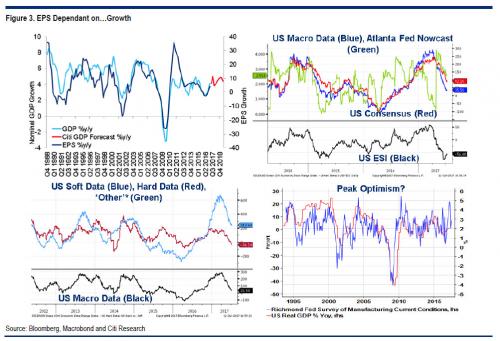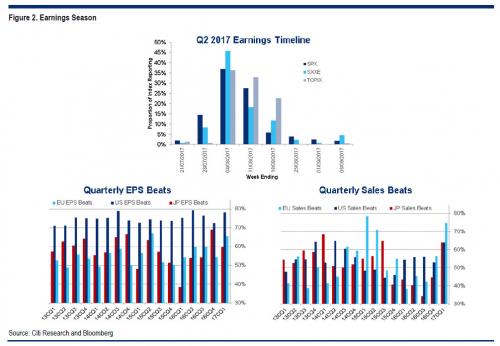Over the next three weeks, the investing world will shift its attention away from the endless chatter of central bankers and concerns about the state of the economy, and instead focus on second quarter earning season, which launched on Friday with results from the three biggest US banks which showed that chronically low volatility is anything but good for trading revenues (as Jamie Dimon made all too clear in a bizarre Friday rant). As previewed last week, and is the norm, we get most of the US numbers first, followed by Europe and then Japan.

And yet, despite expectations for a Q2 S&P500 EPS increase of roughly 7% Y/Y, suggesting solid economic growth, Citi warns that “we may be approaching a cyclical peak.” The biggest concern is that recent economic data, especially the “hard” variety, has been anything but good.
In Citi’s chart of the week, the bank shows the fall in the US Hard Data Surprise Index which on Friday tumbled to a fresh two-year low. The fall to such low levels occurred due to the near one standard deviation miss in June retail sales. In contrast, US soft data surprises are staging somewhat of a recovery at the moment having bounced off recent lows of -56 to -6. This increase was largely due to positive surprises from both ISM surveys.

In addition to the broader Citi Economic Surprise Index, which is now at mid-2015 levels, the Atlanta Fed Nowcast is also beginning to turn over once again (RHS top).

For now, as Citi’s Jeremy Hale notes, forward expectations of earnings for current year and next year in the US are holding up reasonably well compared to previous years (Figure 4, top LHS), however the real question is what happens in Q3/Q4, because as BofA’s Michael Hartnett said earlier this week “the most dangerous moment for markets will be when rising rates combine in three or four months’ time with an inflection point in corporate profits. In anticipation of this, we would use the next couple of months to buy volatility, and within fixed income slowly reduce exposure to IG, HY, and EM bonds.”










Leave A Comment